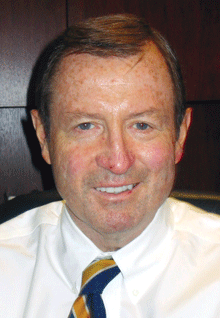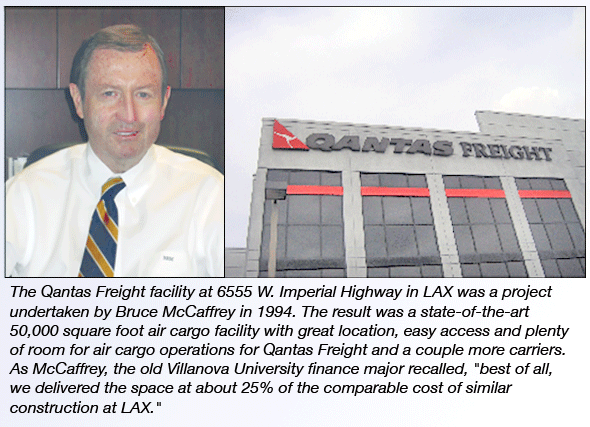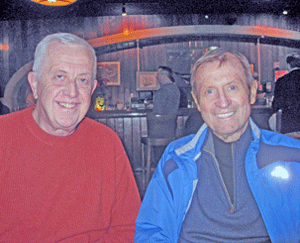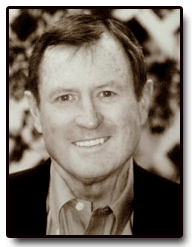 |
“The
air cargo price fixing saga of 2005 was a gas. A mellifluous, malodorous
episode in the history of air cargo.”
 A
story without a happy ending is recalled in 2024 as we mark ten years
since Bruce McCaffrey died February 25, 2014 at age 71 in Bradenton, Florida,
from complications of renal failure. A
story without a happy ending is recalled in 2024 as we mark ten years
since Bruce McCaffrey died February 25, 2014 at age 71 in Bradenton, Florida,
from complications of renal failure.
Bruce worked at Qantas Freight for 26 years
and was among the first people to be caught up and convicted in the air
cargo price fix scandals that began in. 2005.
Last time I saw him he was awaiting the start
of a six-month sentence, but since he had recently had a kidney transplant,
the feds were giving him time to recover.
Bruce McCaffrey attended Harvard Business
School and the UCLA Executive Program in Business, and, like many of us
70-somethings who love America, was a fellow veteran who also served during
the Vietnam War as a U.S. Army helicopter pilot and infantry officer.
After the war he joined National Airlines,
then Pan American, and then Qantas Freight USA, where he served for 26
years as Vice President of Freight for North and South America.
I knew Bruce
when he was out in Valley Stream (a community near JFK International)
after he had succeeded Gil Philaba—and later George Stark—as
boss of Qantas Cargo USA.
He was always by the book and although a
bit distant, he radiated interest in airline history; like me, and as
mentioned was a veteran of Vietnam, so we always found some talking points
aside from business.
I also knew him when Qantas threw him under
the bus.
The story of my final meeting with Bruce
occurred one night close to Christmas 2008, inside the Oyster Bar at Grand
Central Station in Manhattan.
Bruce looked like hell at 160 pounds, his
body evidence to two potentially devastating life events.
One was recovery from a kidney transplant,
and the second was jail time as he was amongst the first of the airline
executives caught up in the price fix scandal.
Bruce told
me about the day when law enforcement swooped into his offices at Qantas
Freight Los Angeles to gather up information, paperwork, and computers
in 2006.
He also remembered the day he fielded a
call from his bosses at the cargo facility ordering him to report to Qantas
headquarters.
Upon arrival, a human resources employee
flown in from headquarters abruptly told him that his job at Qantas was
over “based on performance.”
When Bruce argued that his performance reviews
were always deemed “excellent” and that he led Qantas Freight
USA from 15 percent of total airline air cargo throughput to 25 percent
during his tenure, and that during his watch he had delivered budget numbers
24 out of 26 years (one year his numbers fell was 2001, marked by the
9/11 tragedy), the HR type simply said:
“Actually, we don’t have to
give you a reason.”
 |
The “reason”
became apparent when Qantas went public the next day with the admission
of price fixing, and agreed to pay a fine and jettison Bruce McCaffrey.
“Maybe I should have seen this coming,”
Bruce said when we spoke.
“Qantas management called me six months
before I was terminated and offered me a buyout, but I refused.
“I guess when you look at the landscape
of executives in air cargo that are now taking the package and getting
out, I should have gotten out then too.
“I just thought everything would be
OK, even with the ongoing investigations, and I thought that Qantas would
handle all the price fixing allegations.
“I went about my business as usual,
reporting everything happening in my freight department to my superiors
just as before.”
Bruce McCaffrey
was the first fall guy for a giant international investigation (witch
hunt); at the time, the U.S. DOJ was reportedly looking to convict some
Qantas people headquartered in Australia when they realized they could
not be extradited to the USA.
Testimony from two Qantas Freight employees
that was obtained by DOJ turned out to be, in truth, nothing more than
the word of a couple of low-level types who were promised immunity.
Bruce, DOJ was told, had issued instructions
to secure information concerning rates from competitor airlines.
As the charges
stacked up in front of him, Bruce learned that in order to defend himself
against an international law enforcement frenzy, he would have to put
up all he had and more.
Bruce McCaffrey faced the demand of raising
an impossible half million dollars, the kind of money airline people just
don’t have, to defend himself with no guarantee of success.
Qantas refused to help or support him in
any way, other than to say if he fought the case “and won that they
would share in his legal fees.”
If he fought the case and lost he faced
financial annihilation, fines of one million dollars or more, and a possible
sentence of ten years in jail.
So Bruce McCaffrey, in total survival mode,
agreed to cooperate with law enforcement, serve time, and pay a fine.
 For
Bruce McCaffrey, 2006 was the year that was. For
Bruce McCaffrey, 2006 was the year that was.
Fast forward to 2008.
There he sat, all 160 emaciated pounds,
behind a cup of coffee in the Oyster Bar.
Bruce exited the industry—his entire
life—in some manner of disgrace, while most of the people around
him at Qantas got off scot-free.
“I just spoke to investigators from
Canada this afternoon,” Bruce ventured as we sat in the Oyster.
“Recently I was interviewed by investigators
from New Zealand.
“As often as I am approached now,
I cooperate because of the offer of immunity.
“Investigators want to know about
the business of air cargo,” Bruce McCaffrey said.
What Bruce did not say is what was most
apparent.
Ongoing interviews, by a widening group
of law enforcement characters from an expanding list of countries, served
as primers on air cargo for the prosecutors at home and abroad, who among
other things were looking to make a reputation by descending upon our
industry like a school of blood-thirsty sharks.
As he spoke to
us that last time in 2008, we recalled visiting Bruce in Los Angeles in
2005 at Qantas Freight.
Although at that point, fully on the job,
his health had already declined after a mild stroke.
But Bruce loved what he did and was always
proud to work for and deliver on budget for Qantas Freight.
 I
remember we exchanged memorabilia and did a story on Bruce. I
remember we exchanged memorabilia and did a story on Bruce.
We felt lucky to have that opportunity because
at that point, even after 23 years at Qantas, he almost never appeared
in air cargo media at all.
We suggested a trip down under, but Bruce,
who checked everything with the home office, could not get us a bump up
to Business Class and the trip idea fizzled when I thought of 14 hours
with my chin to my knees. Later, when we thought about it, after the price
fixing scandal hit, how could someone who had to check for an upgrade,
mastermind something as vast as the price-fixing scheme. Ridiculous!
When word came that Bruce McCaffrey, the
straight arrow guy I had known for many years, was in a price fixing beef
with the U.S. DOJ, my first reaction was disbelief.
To this day we still believe he was overwhelmed
by forces at work in a shameful episode in air cargo history.
Now that he is gone, we can only marvel
at the spirit and determination that Bruce—a guy who once lived
for air cargo—gave to air cargo.
Somehow he managed to live another six years
after losing almost everything, except his determination to not back down.
“I never made a major decision that
was not checked with headquarters.
“I’ll be dammed if I will allow
these charges against me to determine my life,” Bruce told me.
And he never did.
A Postscript
Bruce McCaffrey was one of the 21 or so
executives who were under fire during theprice fixing scandal that resulted
in the airlines being fined, something to the tune of USD$1.7 billion
(some of those fines were overturned as late as 2022) with some executives
being given jail time of various lengths.
Now you can say Bruce is/was a felon, who
got caught up in the air cargo scandal during that era.
You can also say that a gang of overzealous
U.S. Government lawyers out to make a career reputation, swooped down
on air cargo and picked off tons of money and people, like shooting fish
in a barrel.
Lufthansa, it should be mentioned, blew
the whistle on everybody with the U.S. Government at the onset in 2005.
I think everybody was hurt and the cargo
people who were charged, served time and came back into the business,
and I can think of three or four people I know that did and are still
working, the view from 2024 is that there should be some room for the
benefit of the doubt and better understanding as to where the fault for
all of this lies.
The story of Bruce McCaffrey, ten years
later, tells us that to brand any of them as no good or not worthy to
be air cargo leaders in 2024 is insensitive and simply wrong.
Lest, we forget.
Geoffrey
|





